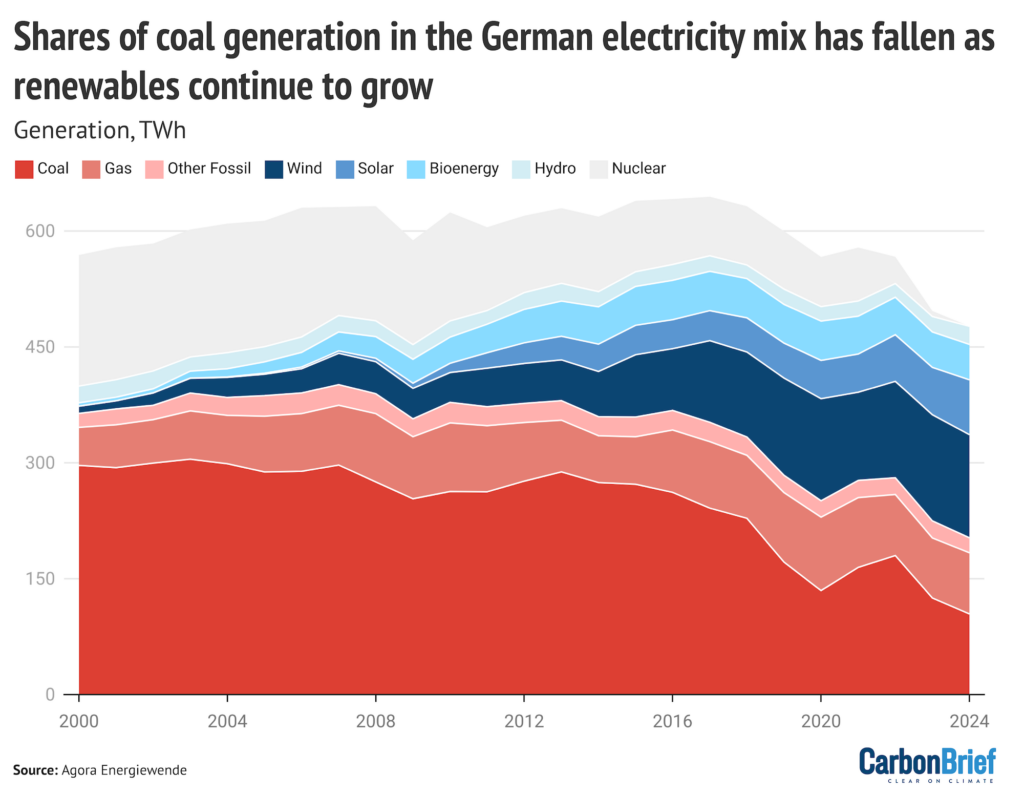Welcome to Carbon Brief’s DeBriefed.
An essential guide to the week’s key developments relating to climate change.
This week
Deadly heat in India and Pakistan
TESTING LIMITS: Temperatures in India and Pakistan climbed to “dangerous levels” this week, CNN reported. Delhi has recorded temperatures above 40C “at least three times this month” and parts of Pakistan are “likely to experience heat up to 8C above normal,” the outlet added. Climate experts told the outlet that “rising temperatures are testing human limits” and warned that, by 2050, “India will be among the first places where temperatures will cross survivability limits”.
HUMAN IMPACT: Balu Lal, a farmer from Rajasthan, told CNN: “We cannot even stand to work…When I am out, I feel that people would burn due to the heat outside. We have nowhere else to go”. According to Berkley researchers’ estimates published in Down to Earth, a single day of an India-wide heatwave “leads to an estimated 3,400 excess deaths nationally”, while a “single five-day heatwave leads to approximately 30,000 excess deaths, distributed across rural and urban districts”.
MONITORING THE HEAT: According to a Himal Southasian investigation published this week, India’s top meteorological scientists and administrators “admitted, on condition of anonymity, that India’s heatwave alert system needed to be updated” and that “temperature readings from automatic weather stations are unreliable”. Elsewhere, the Independent reported that the Philippines also faced dangerous heat, with temperatures reaching 50C in some areas.
Steel crisis spurs sceptics
SEEKING SCAPEGOATS: Some right-leaning voices in the UK parliament and media have seized upon an unfolding steel crisis to “falsely blame” net-zero policies, the Guardian reported. The government passed emergency legislation last weekend to keep the British Steel plant in Scunthorpe open after crisis talks collapsed with its Chinese owners.
COAL QUESTIONS: As noted in Carbon Brief’s daily newsletters, many of the commentators have misleadingly tried to tie the crisis to net-zero policies, as well as Labour’s decision to withdraw government support for a new coking coal mine in England. This is despite the company behind the now-abandoned project saying that the coal produced would not have been high enough quality for use in Scunthorpe.
Around the world
- TRUMP STILL GOING: The US Department of Agriculture said it has cancelled a $3bn programme for “climate-smart farming”, Reuters reported. The newswire also reported on plans by the Trump administration to eliminate the arm of the National Oceanic and Atmospheric Administration that oversees climate research.
- ENERGY TRANSITION: China plans to keep building coal-fired power plants “at least” until 2027, according to a government action plan, Bloomberg reported.
- AUSSIE COP: On the campaign trail ahead of Australia’s May election, prime minister Anthony Albanese said Adelaide will be host city for the COP31 climate summit, if his Labor party is reelected and the country succeeds in a joint bid with Pacific nations, Bloomberg said. His main opponent, right-wing Coalition leader Peter Dutton, was forced to issue a statement saying he believes in climate change following a heated televised debate between the two candidates.
- ALARM BELLS: Environmental and Indigenous groups have warned that a recent amendment to Peru’s Forestry and Wildlife Law could accelerate deforestation in the Amazon, the Associated Press said.
- RAMPING UP RENEWABLES: Bloomberg reported on a private equity fund that is seeking to raise as much as $150m to “boost energy efficiency and install renewable-energy systems in 30,000 buildings in Africa”.
$250 million
The amount set to be disbursed by the UN’s “fund for responding to loss and damage” until the end of 2026, according to Climate Home News.
Latest climate research
- A new study in Geophysical Research Letters found that “snow droughts” – a lack of snow accumulation during winter – are becoming more frequent globally.
- Climate change has tripled the length of marine heatwaves and increased their maximum intensity by 1C since the 1940s, according to new research published in the Proceedings of the National Academy of Sciences.
- New analysis from the World Weather Attribution group found that high levels of vulnerability and poor infrastructure planning were the main drivers of the deadly impacts of floods in Kinshasa, the Democratic Republic of the Congo, earlier this month. Scientists were unable to fully assess the role of climate change due to a lack of available data.
(For more, see Carbon Brief’s in-depth daily summaries of the top climate news stories on Monday, Tuesday, Wednesday and Thursday.)
Captured

The share of fossil fuels in Germany’s electricity mix has fallen continuously over the past 25 years. A new coalition government in Germany said it would continue to support the country’s energy transition towards clean energy, according to Carbon Brief.
Spotlight
Why Nigerians are turning to solar
This week, Carbon Brief reports on how Nigerians are increasingly turning to solar to power their homes and businesses in the face of rising fossil-fuel costs.
Gabriel Folorunsho has sold, installed and repaired solar-power equipment in Nigeria for more than a decade. He trained as an electrical engineer before transitioning into the renewable energy space.
“It is a profitable business,” Folorunso told Carbon Brief. In a month, he can – after deducting operational costs and taxes – earn up to N800,000 (about £400), more than 10 times the federal minimum wage in Nigeria.
In May 2023, the Nigerian government announced the removal of fuel subsidies. The price of petrol, which fuels the private generators relied on by millions of Nigerians for electricity, skyrocketed.
With the national grid, which is powered mostly by gas, continuing to prove unreliable, more Nigerians are on the hunt for viable alternatives for their homes and businesses.
Folorunso said he has experienced a rise in the demand for his services since the fuel subsidy removal: “In the long run, it is extremely cheap because you don’t have to pay for the sun.”
But the upfront cost of solar remains a problem for many Nigerians.
To fill the financing gap, traditional financial institutions have started to market solar financing products.
Private-equity funding has also come onstream. In September 2024, Earthbond, a Nigerian clean-tech startup, raised $200,000 in pre-seed funding. A much older competitor, Arnergy, raised an additional $3m in February 2024 to expand its services.
The Nigerian government and its international partners also see the opportunity. In March, the country’s sovereign fund partnered with a bevy of global actors to launch a $500m fund that targets investments in solar-power solutions for homes and businesses.
The current demand for solar-power products is unmatched, said Ayodele Sodeye, a solar-equipment distributor in Alaba international market, one of the largest electronics hubs in West Africa.
Building community
Folorunso is one of the admins of a 700-member WhatsApp group for solar-power technicians and equipment distributors.
In the group, members make enquiries about equipment pricing, specifications and other technical information.
Certified by Coren, a body that regulates the engineering profession in Nigeria, Folorunso notes that inexperienced technicians have infiltrated the renewable energy space. They are aided by customers who want to cut costs and often end up buying “the wrong cables and batteries”.
“We created the WhatsApp group as a network for people who want to buy original equipment,” Folorunso said. “We [group members] are able to showcase materials that are authentic. We also do some training on the group.”
But there are no formal rules to ensure quality. Sometimes, a deal goes wrong and a member posts an angry message to the group.
Folorunso said it is hard to determine the quality of products. He reeled off the names of brands he has come to trust. Some brand themselves as German, others as Australian.
“But when we dissect them and trace their origin, we discover they are all from China,” he said. “They just brand it differently.”
Recently, the Nigerian government said it was considering a ban on solar-power imports. According to the country’s minister of technology, Uche Nnaji, the ban would boost Nigeria’s domestic energy sector.
While there has been considerable pushback, some local companies have already established plants to manufacture solar panels.
Folorunso believes the ban could help to boost the local economy. But he remains sceptical. “We cannot really validate the experience and performance of these [locally-made] panels,” he said.
Watch, read, listen
EV FUTURES: On the Big Take podcast, Bloomberg’s David Welch and host David Gura analysed the road ahead for General Motor’s big bet on electric and what it means for the electric vehicle revolution in America.
SILENT FIRES: A new analysis by Our World in Data showed that more than half of the area burned globally by wildfire is in Africa.
COP30 SPOTLIGHT: Ahead of the first climate summit in the Amazon, the Guardian reported on the tension between “what the area’s farming lobby wants and what the world needs” in a new series of articles.
Coming up
- 21-25 April: 2025 World Bank and International Monetary Fund Spring Meetings, Washington DC
- 23-24 April: G20 Finance and Central Bank Meeting, Washington DC
- 24-25 April: IEA summit on the future of energy security, London
Pick of the jobs
- CNN Digital, climate data visuals editor | Salary: $77,000-$143,000. Location: US
- Global Energy Monitor, data visualisation editor | Salary: $105,429.26. Location: California (remote)
- Sightline Climate, growth marketing manager | Salary: Unknown. Location: London (remote)
- Involve, engagement lead – climate change and nature | Salary: £45,665-£54,798. Location: UK
- Climate Outreach, content and communications manager | Salary: £43,000. Location: UK (remote)
DeBriefed is edited by Daisy Dunne. Please send any tips or feedback to debriefed@carbonbrief.org.
This is an online version of Carbon Brief’s weekly DeBriefed email newsletter. Subscribe for free here.
The post DeBriefed 17 April 2025: India and Pakistan heat ‘tests human limits’; UK steel crisis sparks net-zero attack; Why Nigerian households are turning to solar appeared first on Carbon Brief.



